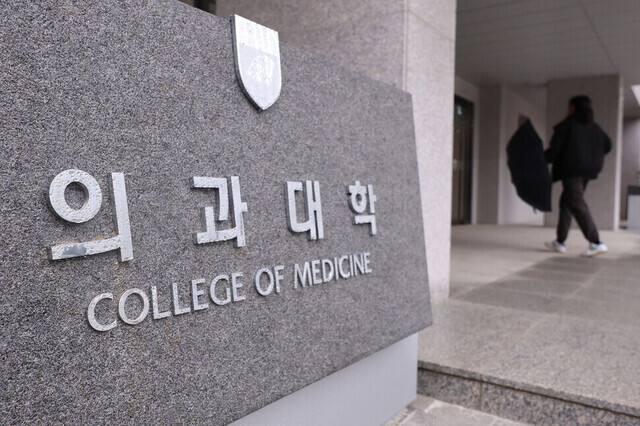hankyoreh
Links to other country sites 다른 나라 사이트 링크
Thousands of Korean med students could be forced to repeat a grade amid mass class boycott

It’s now been over a month since medical students in Korea walked out of classrooms in protest of the government’s policy initiative to increase the annual national medical school admissions quota by 2,000 students. With the collective actions amounting to mass absences throughout the country, there are mounting concerns about a large number of students flunking and thus being forced to repeat a grade.
On Feb. 17, around 160 students at Wonkwang University School of Medicine tendered leaves of absence paperwork to join the mass resignation movement of hospital residents and interns. This sparked a chain reaction at other universities around the country. The number of students who have submitted valid leave of absence applications (as of Saturday) stands at 7,594. That is a whopping 40.4% of all medical school students in the country (18,793). When considering the technically invalid applications for a leave of absence, that number jumps to 13,697 (as of the end of February).
While the Ministry of Education publicly emphasizes dialogue and persuasion, it continues to move to implement the quota increase of 2,000 by allocating additional seats at universities throughout the country.
Appearing on a KBS radio broadcast on Sunday, Education Minister Lee Ju-ho said, “We must absolutely avoid a situation where a high number of students fail to pass.”
However, Lee also declared that the allocations of additional seats “must be implemented as quickly as possible to avoid chaos and confusion.”
Yet as medical students continue their collective walk-out, it appears a mass flunking will be unavoidable, putting a dent in the government’s plan to increase the number of passing students.
According to current laws relating to higher education, medical students must attend at least 30 weeks of classes per year, or 15 weeks per semester, in order to pass. If schools hold classes throughout the scheduled summer vacation, they can delay the start of the new semester — which was supposed to have started at the beginning in March — to the end of May. Realistically, however, when considering the schedules of medical professors, who have to balance lectures with treatment, and the practical workload that students can manage, classes have to start by the end of March or in early April at the latest.
If all the students partaking in the walk-out movement end up being held back a grade, it will cause considerable disruptions. Their courses will overlap with those of the incoming class scheduled to begin courses in 2025, causing large classrooms that will considerably diminish the quality of their medical education. Seniors who were supposed to have graduated will be ineligible for the national medical exam, which will lead to a massive shortage of available residents and interns in the field.
“Whether they take a leave of absence or officially flunk, universities will be forced to hold courses with double the number of students in the following academic year. When considering the faculty, the number of lecture halls, and the available equipment for practical training, this will not be easy. We may even be unable to accommodate the new class of incoming students,” said a dean of a university outside the greater Seoul area.
This is why people are calling for the government and the medical community to come to the negotiation table.
“If medical school students and the government cannot reach a compromise, and the current class of students ends up flunking this semester’s courses, it will be a lose-lose situation for both parties,” said the president of a university outside Seoul.
“The two parties must engage in dialogue and find common ground.”
By Kim Min-je, staff reporter; Park Go-eun, staff reporter
Please direct questions or comments to [english@hani.co.kr]

Editorial・opinion
![[Column] Season 2 of special prosecutor probe may be coming to Korea soon [Column] Season 2 of special prosecutor probe may be coming to Korea soon](https://flexible.img.hani.co.kr/flexible/normal/500/300/imgdb/original/2024/0426/3317141030699447.jpg) [Column] Season 2 of special prosecutor probe may be coming to Korea soon
[Column] Season 2 of special prosecutor probe may be coming to Korea soon![[Column] Park Geun-hye déjà vu in Yoon Suk-yeol [Column] Park Geun-hye déjà vu in Yoon Suk-yeol](https://flexible.img.hani.co.kr/flexible/normal/500/300/imgdb/original/2024/0424/651713945113788.jpg) [Column] Park Geun-hye déjà vu in Yoon Suk-yeol
[Column] Park Geun-hye déjà vu in Yoon Suk-yeol- [Editorial] New weight of N. Korea’s nuclear threats makes dialogue all the more urgent
- [Guest essay] The real reason Korea’s new right wants to dub Rhee a founding father
- [Column] ‘Choson’: Is it time we start referring to N. Korea in its own terms?
- [Editorial] Japan’s rewriting of history with Korea has gone too far
- [Column] The president’s questionable capacity for dialogue
- [Column] Are chaebol firms just pizza pies for families to divvy up as they please?
- [Column] Has Korea, too, crossed the Rubicon on China?
- [Correspondent’s column] In Japan’s alliance with US, echoes of its past alliances with UK
Most viewed articles
- 1‘We must say no’: Seoul defense chief on Korean, USFK involvement in hypothetical Taiwan crisis
- 2Is Japan about to snatch control of Line messenger from Korea’s Naver?
- 3Division commander ordered troops to enter raging flood waters before Marine died, survivor says
- 4S. Korea “monitoring developments” after report of secret Chinese police station in Seoul
- 5The dream K-drama boyfriend stealing hearts and screens in Japan
- 6[Column] Season 2 of special prosecutor probe may be coming to Korea soon
- 7[Editorial] Korea’s surprise Q1 growth requires objective assessment, not blind fanfare
- 8No good, very bad game for Korea puts it out of Olympics for first time since 1988
- 9[Column] ‘Choson’: Is it time we start referring to N. Korea in its own terms?
- 10Is N. Korea threatening to test nukes in response to possible new US-led sanctions body?